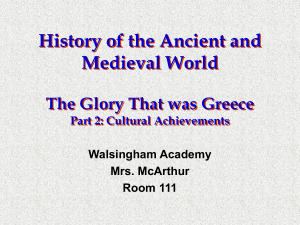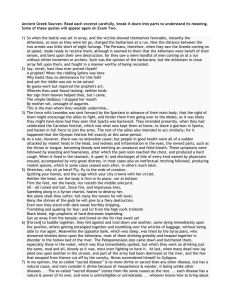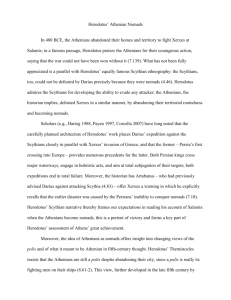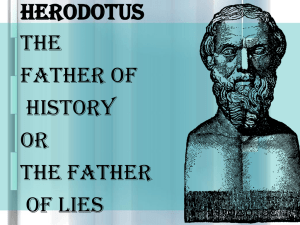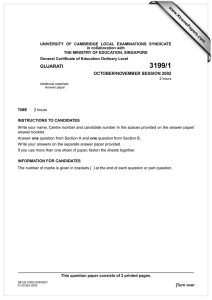9787 CLASSICAL GREEK MARK SCHEME for the May/June 2010 question paper
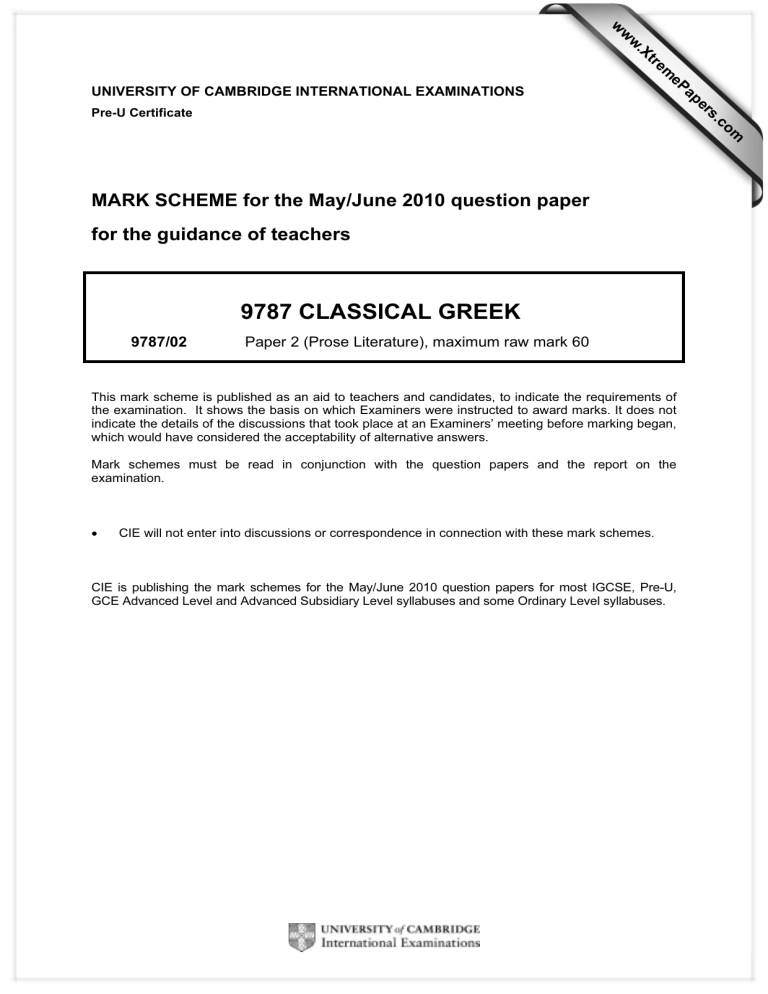
www.XtremePapers.com
UNIVERSITY OF CAMBRIDGE INTERNATIONAL EXAMINATIONS
Pre-U Certificate
MARK SCHEME for the May/June 2010 question paper for the guidance of teachers
9787 CLASSICAL GREEK
9787/02
Paper 2 (Prose Literature), maximum raw mark 60
This mark scheme is published as an aid to teachers and candidates, to indicate the requirements of the examination. It shows the basis on which Examiners were instructed to award marks. It does not indicate the details of the discussions that took place at an Examiners’ meeting before marking began, which would have considered the acceptability of alternative answers.
Mark schemes must be read in conjunction with the question papers and the report on the examination.
• CIE will not enter into discussions or correspondence in connection with these mark schemes.
CIE is publishing the mark schemes for the May/June 2010 question papers for most IGCSE, Pre-U,
GCE Advanced Level and Advanced Subsidiary Level syllabuses and some Ordinary Level syllabuses.
Page 2 Mark Scheme: Teachers’ version
Pre-U – May/June 2010
Section A
Plato, Symposium, 201d–215a3
1 (i) Translate lines 1–8. Translation is marked out of 15, divided by 3.
Syllabus
9787
"kai\ mh/n," h)=n d' e)gw/, "o(mologei=tai/ ge para\ pa/ntwn me/gaj qeo\j
ei)=nai." (3 marks) tw=n mh\ ei)do/twn," e)/fh, "pa/ntwn le/geij, h)\ kai\ tw=n ei)do/twn;"
"sumpa/ntwn me\n ou)=n." (3 marks) kai\ h(\ gela/sasa "kai\ pw=j a)/n," e)fh, "w)= Sw/kratej, o(mologoi=to me/gaj qeo\j ei)=nai para\ tou/twn, (4 marks) oi(/ fasin au)to\n ou)de\ qeo\n ei)=nai;" (2 marks)
"ti/nej ou(=toi;" h)=n d' e)gw/."
"ei(=j me/n," e)/fh, "su/, mi/a d' e)gw/." (3 marks)
Paper
02
[5]
• o(mologei=tai\ ge para\ pa/ntwn : Socrates' confident assertion that everyone agrees that
Love is a great god is subtly deflated by Diotima's question.
• Her distinction between those who know and those who don't surprises Socrates and puts him on the defensive.
• The repetition of pa/ntwn and Sumpa/ntwn is striking and adds to Socrates' confusion as his argument is refuted.
• The reference to Diotima herself laughing at Socrates makes clear that she is the dominant force in the conversation.
• Diotima's assertion that Socrates is one person who says that Love is no god at all and that she is another "E(=ij me/n ... su, mia/ d' e)gw/" is amusing and authoritative, as
Socrates has just stated the exact opposite.
• When Socrates asks Diotima how she can argue for this, her confident reply ‘easily’ is very entertaining.
Credit should also be given to candidates who make similar or other valid points. [6]
© UCLES 2010
Page 3 Mark Scheme: Teachers’ version Syllabus Paper
Pre-U – May/June 2010 9787 02
(iii) Candidates should closely refer to the detail of the argument throughout the passage.
• Diotima's initial premise that all gods are happy ( eu)dai/mwn ) and beautiful is a good starting point for her argument. Socrates is hardly likely to disagree with this.
• Her second premise that those are eu)dai/mwn possess good and beautiful things follows naturally enough from the meaning of the Greek word.
•
However, this might be a point that candidates might detect as an unjustified assumption. Could a god be happy even though it desired something it lacks? For example, Eros might by his very nature enjoy the quest for what he does not have.
• The possibility remains that there might also be other things that make a god happy, other than the possession of good things; for example a god might be happy if he fulfils his own function in the world.
• Socrates has previously admitted that Eros, from lack of good and beautiful things, desires the things he lacks.
• He is now forced to agree that Eros does not fulfil his criteria to be called a god.
•
Thus Diotima's conclusion is that Socrates is a person who does not consider Love to be a god.
•
The significant flaw in the argument is the step that because Eros desires good and beautiful things, he lacks them. Just as rich people might desire more money, so Eros may already be beautiful, but desire more beautiful things.
•
Certainly, Diotima is effective in undermining Socrates' initial sweeping statement that everyone agrees that Love is a great god. However, the argument does contain logical flaws. [9]
2 (i) Translate lines 1–5. Translation is marked out of 15, divided by 3. tau=ta me\n ou=n ta e)rwtika\ i)/swj, (2 marks) w)= Sw/kratej, ka)\n su\ muhqei/hj: (2 marks) ta\ de\ te/lea kai\ e)poptika/, w(=n e/(neka kai\ tau=ta e)/stin, (3 marks) e)a/n tij o)rqw=j meti/$, ou)k oi)=d' ei) oi(=o/j t' a)\n ei)/hj.
(3 marks) e)rw= me\n ou)=n, e)fh, e)gw\ kai\ proqumi/aj ou)de\n a)polei/yw: (3 marks) peirw= de\ e(pesqai, a)\n oi(=o/j te $)=j.
(2 marks)
© UCLES 2010
Page 4 Mark Scheme: Teachers’ version Syllabus Paper
Pre-U – May/June 2010 9787 02
(ii)
• Diotima begins by saying that the person seeking beauty should begin to encounter beautiful bodies from his youth.
• She then speaks of a conductor, o( h(goumenoj , who can lead the pupil to understand true beauty.
• Diotima argues that beauty attached to one body is related ( a)delfo/n ) to beauty attached to another.
•
She later asserts that beauty in all bodies should be regarded as one and the same in order that the philosopher can seek beauty in form: to\ e)p' ei/)dei kalon .
• What she means by this is that the beauty manifested in all beautiful things is ultimately one.
• Thus she argues that the lover should admire all beautiful bodies and thus regard his admiration for one particular beautiful body as a trivial matter.
• Like many of Plato's writings, this passage considers the relationship between the particular (one particular beautiful body) and the general (how beautiful bodies are related to each other).
• The whole passage considers the quest for beauty as a form of progression from individual examples through to contemplation of the idea of beauty. Candidates should be credited if they assess whether this is convincing or not.
(iii) The Greek text must be referred to when appropriate. The following points might be included:
• The use of the comparative timiw/teron makes clear that Plato sees beauty of the soul as more significant that beauty of the body.
• The use of the two infinitives e)ran and kh/desqai is effective in emphasing how the lover of beauty should care for the beauty of the soul.
• The ti/ktein makes the point that the lover of beauty should be active in generating useful conversation to improve young men, just as Socrates always was. The choice of the word ti/ktein is particularly striking here.
• The point that the lover of beauty should seek out conversation that will improve the character of young people is important. This is particularly ironic as Socrates was executed on the charge of corrupting the youth, and Plato is often keen to demonstrate that this was a gross injustice.
• The move from considering the beauty of the soul to beauty in the state's laws and customs widens the scope of the discussion and adds significance to the argument
• The Greek phrase pa=n au)to\ au(t% suggene/j (‘beauty is all akin to itself’) is certainly striking and effectively summarises Plato's central idea.
Candidates who make other valid points, based on the Greek text, should receive credit.
© UCLES 2010
Page 5 Mark Scheme: Teachers’ version
Pre-U – May/June 2010
Herodotus Histories VI, 74–84; 94–117; 132–140
Syllabus
9787
Paper
02
• The fact that Herodotus gives us Pheidippides' name is important and grabs the reader's attention.
• It is interesting that Herodotus describe him as a h(merodro/mon , ‘day-runner’ and stresses that he practised this skill ( tou=to meletw=nta ). This engages his audience in the story.
•
Herodotus tells us that the story of Pheidippides' encounter with Pan is dependent on his own account, as there were no other witnesses.
•
Herodotus names the particular mountain (Mount Parthenium), where Pheidippides supposedly met Pan.
• Bw/santa de\ to\ ou/)noma … When Pan calls Pheidippides by name, this is striking, particularly with the use of the emphatic word Bw/santa .
• Pan complains that the Athenians have not been paying him any attention at all with the emphatic phrase ou)demi/an e)pimelei/hn .
• e)o/ntoj eu)no/ou A)qhnai/oisi contrasts with the previous phrase, explaining that Pan is naturally well disposed to the Athenians.
• In line 8, candidates could point out the contrast between past and future, expressed with the participles genome/nou and e)some/nou ; Pan's intention to be generous is emphasised by the point that he has often been useful to the Athenians in the past and that he would again be useful to them in the future; (reinforced by e)ti )
• Moving on to the Athenians' response, the fact that they took action once their affairs were back in order (i.e. after they have defeated the Persians at Marathon) indicates that they took this story seriously.
•
The pisteu/santej ei)nai a)lhqe/a is engaging, and emphasises that the
Athenians had faith in Pheidippides' story.
• Herodotus includes the interesting point of detail that Pan's shrine was built under the
Acropolis, which again indicates the importance of their desire to keep the god's favour.
• The details of the annual ceremony with a torch race and sacrifices show how the
Athenians had continued to honour Pan until Herodotus' own time and this would certainly engage his Athenian readers and audience.
Candidates must be credited when they come up with good other explanations for the level of detail in this passage.
© UCLES 2010
Page 6 Mark Scheme: Teachers’ version
Pre-U – May/June 2010
Syllabus
9787
Paper
02 lines of the following ideas.
• Note the juxtaposition of Spartans and Athenians in line 15.
• The A)qhnai=oi u(me/wn de/ontai sfi/si bohqh=sai shows that the Athenians are eagerly requesting Spartan help.
• Pheidippides uses compelling language when he begs the Spartans not to overlook the most ancient city of Greece: mh\ periidei=n po/lin a)rxaiota/thn . The use of the superlative is significant.
•
Pheidippides' uses of pathos to advance his argument; for example pleading with the
Spartans to save Athens from being crushed by foreign invaders ( pro\j a)ndrw=n barba/rwn ) and from falling into slavery ( doulosu/n$ ).
•
Pheidippides again shows eloquence in his reference to the conquest of Eretria by the
Persians; the use of the word h)ndrapo/distai is striking.
• Note also the repeated reference to Hellas.
•
Pheidippides' speech ends with an impressive conclusion po/?li logi/m% h( E(lla\j ge/gone a)sqeneste/rh , demonstrating to the Spartans what might happen if they refuse to help the Athenians.
Candidates who make other valid points, based on the Greek text, should receive credit.
(iii) Translate lines 21–25. Translation is marked out of 15, divided by 3.
"O( me\n dh\ sfi ta\ e)ntetalme/na a)ph/ggelle, (3 marks) toi=si de\ e(/ade me\n bohqe/ein A)qhnai/oisi, (2 marks) a)du/nata de/ sfi h=)n to\ parauti/ka poie/ein tau=ta ou) boulome/noisi lu/ein to\n no/mon:
(5 marks) h=n ga\r i(stame/nou tou= mhno\j ei)na/t$ de\ ou)k eceleu/sesqai e)/fasan (3 marks) mh\ ou) plh/reoj e)o/ntoj tou= ku/klou.
(2 marks)
© UCLES 2010
Page 7 Mark Scheme: Teachers’ version
Pre-U – May/June 2010
Herodotus Histories VI, 74–84; 94–117; 132–140
Syllabus
9787
Paper
02 comments:
• In this passage, Miltiades is depicted as reckless and untrustworthy. He doesn't tell the
Athenians the purpose of his expedition, but he entices them with the prospect of making money; the word kataploutiei=n emphasises this point.
• The o(/qen xruso\n eu)pete/wj a)/fqonon oi)/sontai indicates that Miltiades made a reckless promise and failed to tell the Athenians about the dangers of the expedition against the Parians.
• By using the word e)paerqe/ntej , Herodotus indicates the Athenians were carried away by Miltiades' promises, again portraying him as irresponsible.
• The contrast between the phrases pro/fasin e)/xwn and tou=to me\n dh\ pro/sxhma lo/gou h)=n stresses that Miltiades was dishonest about his motivation for suggesting the attack on the Parians.
•
Miltiades appears petty when Herodotus claims that his real motive was his personal grudge against Lysagoras the Parian.
Candidates who make other valid points, based on the Greek text, should receive credit. marks on this question. Below are some examples of possible points.
• The Pari/ouj kateilhme/nouj e)ntoj tei/xeoj states clearly and emphatically that the Parians were driven within their defences.
• The exact detail that Miltiades demanded 100 talents of tribute engages the reader. This is a huge amount of money, (roughly 6 times what they paid yearly for the Delian
League) giving the Parians little choice, but to fight.
• Miltiades' threat not to withdraw his army until he captured the city unless they paid the tribute is stated bluntly and forcefully. The use of the word e)cel$ is particularly striking.
• The o(/kwj me/n ti dw/sousi Miltia/d$ a)rguri/ou, ou)de\ dienoeu=nto (they had not the least intention of giving Miltiades any money) is striking. This phrase stresses the determination of the Parians to resist.
• The Parians' resolve is further emphasised by the next phrase, oi( de,\ o(/kwj diafula/cousin th\n po/lin, tou=to e)mhxanw=nto (they began to use their ingenuity in order to defend their city). Note the use of me/n and de/ to link these two phrases.
• Herodotus uses the phrase a)/lla te e)pifrazo/menoi to indicate that the Parians devised a number of different methods of defence.
• He then emphasises one of these defensive methods in particular; firstly using the phrase t$= ma/lista e)/ske e(ka/stote e)pi/maxon tou= tei/xeoj (and whatever point in the wall was from time to time vulnerable to attack), which indicates the Parians' attention to detail.
© UCLES 2010
Page 8 Mark Scheme: Teachers’ version Syllabus Paper
Pre-U – May/June 2010 9787 02
• Herodotus then stresses the extent of their defensive countermeasures by the fact that they raise the wall to twice its original height during the night.
Candidates who make other valid points, based on the Greek text, should receive credit.
E)j me\n dh\ tosou=to tou= oi( pa/ntej E(/llhnej le/gousi, (3 marks) to\ e)nqeu=ten de\ au)toi Pa/rioi gene/sqai w(de le/gousi, (3 marks)
Miltia/d$= a)pore/onti e)lqei=n e)j lo/gouj ai)xma/lwton gunai=ka, (4 marks) e)ou=san me\n Pari/hn ge/noj, ou)/noma de/ oi( ei)=nai Timou=n, (3 marks) ei)=nai de\ u(poza/koron tw=n xqoni/wn qew=n.
(2 marks)
© UCLES 2010
Page 9 Mark Scheme: Teachers’ version Syllabus Paper
Pre-U – May/June 2010 9787
Section B
5 What methods of persuasion does Diotima employ? How successful are they?
02
For AO1, candidates should demonstrate accurate knowledge of Diotima's arguments; for example her view that Eros (Love) has a moral purpose, as it can lead the lover to appreciate true beauty. The function of Love is physical and spiritual procreation, which is motivated by the desire for immortality. Diotima argues that Love should be viewed as a great spirit rather than a god.
For AO3, candidates will need to assess Diotima's arguments in terms of their logic and their persuasive qualities. Certainly her first argument is effective in demonstrating that Socrates appears to believe three propositions that cannot all be true; namely that Love is a god, that Gods lack nothing, that Love desires good and beautiful things that he lacks. Diotima's arguments are less persuasive when she is putting forward positive views. The myth of the birth of Love is engaging and entertaining, but it is hardly likely to persuade a sceptical opponent. Her statement that Love is the desire of good things and of being happy is more credible. Her refinement of this statement that Love loves the good to be one's own forever is explained carefully. However,
Diotima's further argument that the aim of those who love is to beget a beautiful thing by the body and the soul, and that procreation is the desire for immortality is perhaps more far-fetched.
Diotima's further arguments appear influenced by Plato's Theory of Forms and his epistemology, and are unlikely to be persuasive to those who reject this view of the world. However, these arguments are serious and substantial. Their literary effect is striking and the idea that Love can leave the lover with beauty and goodness is inspiring. Candidates should be credited for developing their own argument, provided that it is coherent and well-supported from the text.
6 To what extent does Plato depict Diotima, Socrates and Alcibiades as contrasting and engaging characters?
For AO1, candidates should refer to all three main characters and base their analysis on effective reference to the text of this excerpt. They should refer accurately to Diotima's dialogue with
Socrates and to Alcibiades' entrance towards the end of the excerpt.
For AO3, candidates should make the distinction between the representation of Diotima as serious and thoughtful, while Alcibiades is rowdy and provocative. Socrates himself is represented as a humble pupil learning from the sage Diotima, which is an amusing reversal of his usual role in Plato's dialogues. Candidates may well also observe that Diotima is represented as a very forceful character; she makes strong assertions and doesn't hesitate to rebuke
Socrates when she feels that his argument is weak or that he is not pursuing the enquiry with sufficient rigour. A good example of this is when she says, ‘How do you design to become a master of love-matters, if you can form no notion of this?’ Diotima's authority is demonstrated by her long speeches, which are eloquent and thought-provoking and even at times inspiring.
Alcibiades' arrival completely changes the atmosphere of the dialogue, and he provokes Socrates to be more active in the discussion as well. Socrates is characterised more fully in latter part of the extract than before. Alcibiades' praise of Socrates is carefully prepared, so we realise that
Alcibiades will have some interesting thoughts to offer and that he will give us a new insight into
Socrates' personality. Again, candidates should be credited for developing their own argument, provided that it is coherent and well-supported from the text.
© UCLES 2010
Page 10 Mark Scheme: Teachers’ version Syllabus Paper
Pre-U – May/June 2010 9787 02
7 What are the strengths and weaknesses of Herodotus' account of the battle of Marathon and the events leading up to it?
For AO1, candidates should demonstrate accurate knowledge of the relevant prescribed sections of Herodotus VI, such as the Persians attacks on Naxos and Eretria, Pheidippides' mission to
Sparta, Hippias' dream, the arrival of the Plataeans, the differing views of the Athenian generals,
Miltiades' speech before the battle, the role of Callimachus, the description of the battle itself including the tactics, the fallen individuals and the casualty figures.
For AO3, candidates may well argue that the main strength of Herodotus' account is how effectively he engages his readers. Herodotus' narrative appears systematic and detailed, he states his facts confidently, but often without reference to sources. Hippias' dream and Miltiades' speeches are entertaining, but they are typical of earlier literary texts, such as Homeric epic.
Herodotus' description of the battle of Marathon appears coherent and logical, but we may consider how anyone could be certain of the events and tactics of the battle. The description of heroic individuals, such as Callimachus and Cynegirus, is certainly moving and is consistent with other sources (e.g. Aeschylus). Herodotus' figure for the Athenian dead is probably accurate as the Athenians compiled names for an official casualty list, which they engraved on their monument to the fallen. His figure for the Persian dead may well be too high, but it compares favourably to the exaggerations of later writers. Herodotus' literary skills mean that that his account is certainly memorable; however a certain level of scepticism is probably healthy when considering the events of the Marathon campaign historically. Candidates should be credited for developing their own views of the strengths and weaknesses of Herodotus' account of the battle of Marathon and the events leading up to it, provided that they are coherent and well-supported from the text.
8 Is it fair to accuse Herodotus of being biased in favour of the Athenians?
For AO1, candidates should demonstrate accurate knowledge of Herodotus' description of the
Spartan king Cleomenes and his campaign against Argos, the Persians attack on Eretria and the
Eretrians’ failure to put up effective resistance, the help that the Plataeans gave to the Athenians, the tensions between the Thebans and the Plataeans, and most importantly a detailed knowledge of what Herodotus says about the Athenians' action before, during and after the Marathon campaign.
For AO3, candidates should explain how they understand the term ‘biased’. They may well conclude that Herodotus seems to aim much of his narrative at an Athenian audience for his recitations there, but that he is capable of criticising the Athenians, as well as praising them.
Herodotus does appear quite harsh in his analysis of Cleomenes, the Spartan king. He includes traditions that are hostile to Cleomenes and does not record information that we know from other sources which is more favourable. Spartan government, though, was divided during this period and Herodotus' narrative does help us to understand the disputes within the leading Spartan families.
Candidates might consider whether Herodotus fails to give the Eretrians sufficient credit in comparison to the Athenians. Certainly the contrast in their level of resistance is striking.
However, Herodotus does credit Aeschines the Eretrian with the patriotism to give the Athenians good advice. Most candidates may well conclude that Herodotus' narrative of the fall of Eretria is fair and balanced. Herodotus shows that he can credit Greeks other than the Athenians with his positive description of the Plataeans. As they were the Athenians’ most loyal allies, this is hardly surprising. Certainly Herodotus' positive view of the Plataean alliance with Athens would have gone down well with an Athenian audience.
© UCLES 2010
Page 11 Mark Scheme: Teachers’ version Syllabus Paper
Pre-U – May/June 2010 9787 02
Herodotus' analysis of the Athenians’ action at the battle of Marathon is very positive; this is, however, understandable. He certainly portrays the leading Athenian commanders, such as
Miltiades and Callimachus, as heroes, but he makes clear that other generals were by no means so resolute. His praise of the heroic dead, such as Stesilaus and Cynegirus is very moving. His statement that the Athenians were the first Greeks to charge at the Persians at a run is very striking. It certainly would have pleased the Athenian audience, but it fits the spirit of the events at
Marathon, even if it is unfair to the previous Greeks who had fought the Persians, such as the
Ionians. Herodotus' positive portrayal of the Athenians at Marathon is completely understandable.
They were heroic in resisting the Persians with very few allies. They took a big risk, but were victorious.
Herodotus is certainly critical of the Athenians during his description of Miltiades' later campaign against the Parians. The Athenian assembly appears gullible in supporting his proposal, while
Miltiades himself is depicted as devious and motivated by personal spite rather than public goodwill. Thus it is fair for candidates to argue that Herodotus is sympathetic towards the
Athenians and that he almost certainly was concerned to please an Athenian audience. It is, however, unfair to accuse him of systematic bias in their favour. Again, candidates should be credited for developing their own argument, provided that it is coherent and well-supported from the text.
© UCLES 2010
